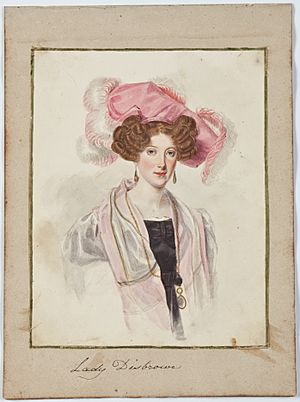Anne Disbrowe facts for kids
Quick facts for kids
Anne Disbrowe
|
|
|---|---|

A watercolour of Disbrowe, c. 1825–28
|
|
| Born |
Charlotte Anne Albinia Kennedy
1795 New Jersey, United States
|
| Died | 18 October 1855 (aged 59–60) |
| Spouse(s) | Sir Edward Cromwell Disbrowe (m. 1821) |
| Children | Charlotte Disbrowe Jane Harriet Wise |
| Parent(s) | Hon. Robert Kennedy Jane Macomb |
Charlotte Anne Albinia Disbrowe (1795–1855) was a British woman who lived in other countries. This was because her husband, Edward Cromwell Disbrowe, was a diplomat. She was known for hosting social events.
She wrote many letters while living in Russia. These letters were later published. They help historians understand what life was like at the Russian royal court in the early 1800s.
Contents
Anne Disbrowe's Early Life
Her Family Background
Anne Kennedy was the oldest child of Robert Kennedy. Her grandfather was Archibald Kennedy, the 11th Earl of Cassilis. Anne's mother was Jane Macomb. Jane's father was a successful American businessman.
Anne was born in New Jersey, USA, in 1795. Her family lived there for several years. Later, they moved to England.
Marriage and Children
On October 24, 1821, Anne married Edward Cromwell Disbrowe. He was a British diplomat. They met in Switzerland. Their first child was born in Berne the next year.
In late 1822, they moved back to England. Edward became a Member of Parliament (MP) for Windsor. The family lived at Walton Hall in Derbyshire. Anne and Edward had four children who lived to be adults. They had two daughters, Charlotte and Jane, and two sons, Edward and William.
Life as a Diplomat's Wife
Living in Russia
In April 1825, Edward Disbrowe went to Saint Petersburg, Russia. He was sent there to work for Tsar Alexander I. Anne followed him in June, with her father.
They thought their stay would be short. So, they left their two young daughters in England. They worried the sea trip would be too dangerous for them. The girls stayed with Anne's parents.
Events at the court made their stay longer. Tsar Alexander died, which led to a revolt. Then Nicholas I became the new Tsar. The Disbrowes moved to Moscow in 1826. They were part of a large English group for the new tsar's coronation.
There was no permanent ambassador from England in Russia. This meant Anne was the highest-ranking English lady there. She had many social duties. This further delayed their return home.
Separation from Children
Anne's letters show how much she missed her children. She and her husband thought about sending for them. But they worried about the dangers of travel and Russia's cold weather. Anne did not see her daughters again until March 1828. This was a gap of three years.
Later Diplomatic Posts
After Russia, Edward Disbrowe worked in Württemberg and Stockholm. In 1831, he was knighted. This meant he received the title "Sir."
In January 1836, the family moved to The Hague. Edward worked there as an envoy. He became ill in September 1851 and died on October 29. His family then returned to England.
Edward left his wife and two daughters £500 each year. The family properties were later divided. Charlotte inherited Walton Hall. Jane received an estate in Northamptonshire.
Anne's son Edward died in 1854. Her daughter Charlotte said that Anne's "health never recovered from that terrible loss." Anne died in October of the next year.
Anne Disbrowe's Legacy
Anne's daughter Charlotte later published many of her mother's letters. These letters have given historians important information. They show what life was like at the Russian court in the early 1800s.
Charlotte edited a collection of letters. They were printed in 1878 for private use. The book was called Original Letters from Russia 1825–1828. Some of these letters were later used in another book. This book was called Old Days in Diplomacy: Recollections of a Closed Century. It was published in 1903.
 | Ernest Everett Just |
 | Mary Jackson |
 | Emmett Chappelle |
 | Marie Maynard Daly |

